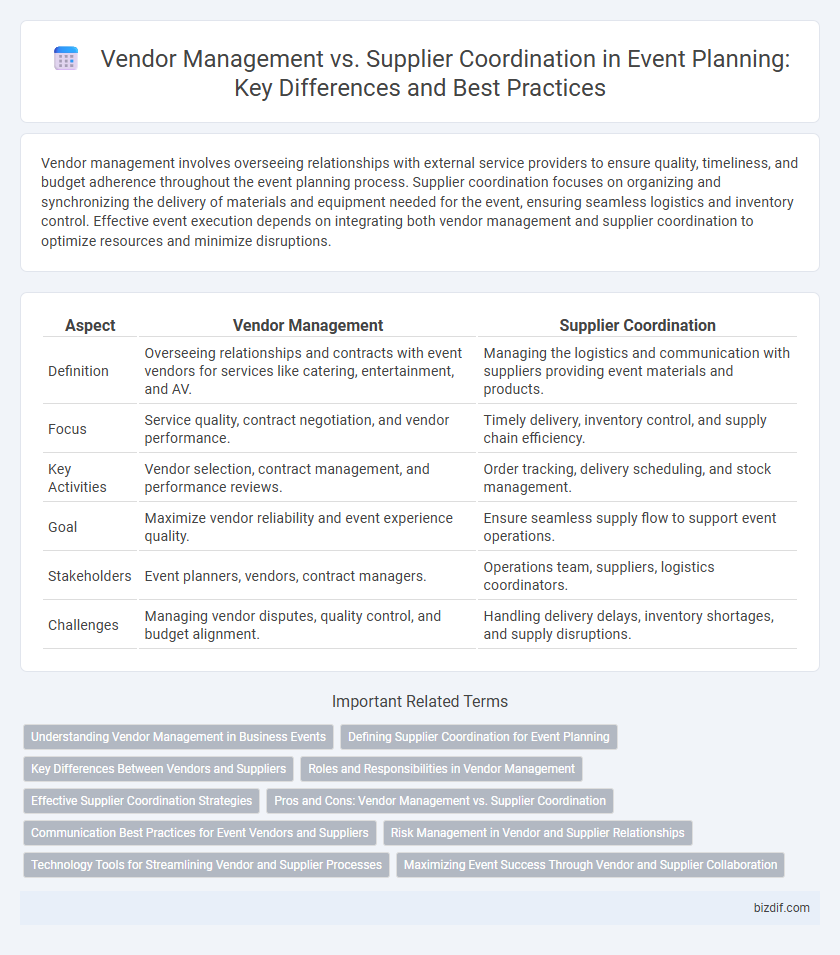Vendor management involves overseeing relationships with external service providers to ensure quality, timeliness, and budget adherence throughout the event planning process. Supplier coordination focuses on organizing and synchronizing the delivery of materials and equipment needed for the event, ensuring seamless logistics and inventory control. Effective event execution depends on integrating both vendor management and supplier coordination to optimize resources and minimize disruptions.
Table of Comparison
| Aspect | Vendor Management | Supplier Coordination |
|---|---|---|
| Definition | Overseeing relationships and contracts with event vendors for services like catering, entertainment, and AV. | Managing the logistics and communication with suppliers providing event materials and products. |
| Focus | Service quality, contract negotiation, and vendor performance. | Timely delivery, inventory control, and supply chain efficiency. |
| Key Activities | Vendor selection, contract management, and performance reviews. | Order tracking, delivery scheduling, and stock management. |
| Goal | Maximize vendor reliability and event experience quality. | Ensure seamless supply flow to support event operations. |
| Stakeholders | Event planners, vendors, contract managers. | Operations team, suppliers, logistics coordinators. |
| Challenges | Managing vendor disputes, quality control, and budget alignment. | Handling delivery delays, inventory shortages, and supply disruptions. |
Understanding Vendor Management in Business Events
Vendor management in business events involves strategic oversight of multiple service providers to ensure quality, cost-effectiveness, and timely delivery, while supplier coordination primarily focuses on the logistical aspects of procurement and delivery. Effective vendor management integrates contract negotiation, relationship building, and performance evaluation to optimize event outcomes. This holistic approach reduces risks, enhances collaboration, and drives superior attendee experiences through reliable vendor partnerships.
Defining Supplier Coordination for Event Planning
Supplier coordination in event planning involves organizing and aligning the activities of multiple suppliers to ensure timely delivery of goods and services needed for the event. It requires effective communication, scheduling, and logistical oversight to synchronize supplier contributions such as catering, equipment rental, and decor setup. Clear expectations and real-time updates minimize delays and enhance overall event execution quality.
Key Differences Between Vendors and Suppliers
Vendor management focuses on building and maintaining relationships with businesses providing finished goods or services directly to clients, emphasizing contract negotiation, quality control, and performance monitoring. Supplier coordination involves overseeing the procurement of raw materials or components needed for production, ensuring timely delivery, cost efficiency, and inventory management. Key differences include vendors delivering end products or services to customers, while suppliers provide the essential inputs required for those products.
Roles and Responsibilities in Vendor Management
Vendor management in event planning involves selecting, negotiating, and maintaining relationships with external service providers to ensure quality and reliability. It includes contract management, performance evaluation, and risk mitigation to align vendor services with event objectives. Supplier coordination focuses more narrowly on logistics and timely delivery of goods, whereas vendor management encompasses strategic oversight and long-term partnership development.
Effective Supplier Coordination Strategies
Effective supplier coordination strategies in event planning emphasize clear communication, timely delivery, and performance monitoring to ensure seamless execution. Establishing detailed contracts and maintaining regular check-ins help mitigate risks and align supplier services with event objectives. Leveraging technology platforms enhances real-time tracking and fosters collaboration between planners and suppliers for optimized event outcomes.
Pros and Cons: Vendor Management vs. Supplier Coordination
Vendor management involves overseeing contracts, performance, and relationships with multiple service providers, ensuring quality and timely delivery; however, it can be resource-intensive and complex. Supplier coordination focuses on aligning supply chain logistics and order fulfillment, which optimizes inventory and reduces delays but may lack comprehensive service oversight. Effective event planning often requires balancing both approaches to maximize efficiency while minimizing risks associated with service quality and supply disruptions.
Communication Best Practices for Event Vendors and Suppliers
Effective communication with event vendors and suppliers hinges on clear, consistent, and proactive information exchange to avoid misunderstandings and ensure timely delivery. Establishing centralized communication channels such as project management platforms or group messaging enhances real-time updates and accountability across all parties. Regular check-ins and detailed contracts outlining expectations align vendor management and supplier coordination efforts, optimizing overall event execution.
Risk Management in Vendor and Supplier Relationships
Effective vendor management incorporates comprehensive risk assessment processes to identify potential financial and operational disruptions, ensuring contract compliance and performance reliability. Supplier coordination emphasizes proactive communication and contingency planning to mitigate supply chain interruptions, maintaining event timelines and quality standards. Both strategies enhance risk management by fostering accountability and resilience in vendor and supplier relationships, crucial for seamless event execution.
Technology Tools for Streamlining Vendor and Supplier Processes
Technology tools for vendor management integrate contract tracking, performance analytics, and communication platforms to optimize relationships and service quality. Supplier coordination benefits from automated inventory updates, order processing, and delivery scheduling systems that enhance real-time collaboration and reduce errors. Utilizing cloud-based software solutions centralizes data, improving transparency and decision-making efficiency across both vendors and suppliers in event planning.
Maximizing Event Success Through Vendor and Supplier Collaboration
Maximizing event success relies on effective vendor management and supplier coordination, ensuring seamless collaboration throughout the planning process. Vendor management emphasizes building strong relationships and negotiating contracts to secure quality services, while supplier coordination focuses on scheduling and logistics to maintain timely delivery of materials and equipment. Integrating both strategies optimizes resource allocation, reduces risks, and enhances overall event execution.
Vendor management vs Supplier coordination Infographic

 bizdif.com
bizdif.com